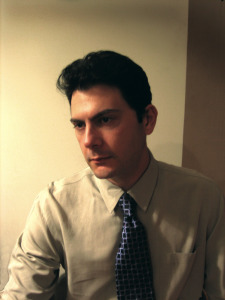
Ben Greenman is the author of Celebrity Chekhov, which has been called “nothing short of brilliant” by Daily Candy. Greenman is an editor at the New Yorker and the author of several acclaimed books of fiction, including Superbad, Superworse, and A Circle is a Balloon and Compass Both: Stories About Human Love. His fiction, essays, and journalism have appeared in numerous publications, including the New York Times, the Washington Post, the Paris Review, Zoetrope: All Story, McSweeney’s, and Opium. He lives in Brooklyn with his wife and two children.
***
UF Review: Your book, Celebrity Chekhov, has been getting a lot of buzz lately. What’s your relationship to this book? How do your relationships with your work change over time?
Greenman: My relationship to the book? I am its father. I think any time you work on a book for a while, that’s the nearest to your heart. In this case, it’s a little bit different, because the stories in the collection are all originally Anton Chekhov’s. I dragged them into the present. I made them dress differently. I am its evil stepfather.
UF Review: Like Celebrity Chekhov, your “faux musicals” seem to be commentaries on our modernity, our current state of affairs. What are you trying to get at?
Greenman: I think that the world’s in a little bit of a crisis. We have, as a culture, taken our eyes off the ball. There was a story the other day about how Bill Nye, the Science Guy, passed out during a speech. Many people in the audience, instead of calling for help, took out their phones and Blackberries and began to tweet. The article dubbed the phenomenon “youthful digital passivity,” which is elegant but also far too polite for the problem, which is monstrous. Celebrities are a related problem — or, more to the point, our obsession with these larger-than-life, flatter-than-thou people. There’s never been a time in my life when so much of my day was spent tracking the movements of people I don’t really care about. Think of all the energy that’s being spent on Justin Bieber, or Mel Gibson. I’m not against celebrity or fame. I just want people to think about why we grant a small number of people this disproportionate amount of attention, and why we don’t see that it makes us at once self-absorbed and hollow.
UF Review: Back to your book, why did you decide to riff on Chekhov’s work? Is he a particular influence on you? If so, what other authors and books influence your work?
Greenman: Sure. Chekhov’s an influence because of the way his stories use what seem like ordinary circumstances to develop universal insights about humanity. Other authors who influence me? There are too many to list, but here are some: Stanley Elkin, Mary Robison, Joseph Conrad, Henry James, Emily Dickinson. Some of them are influences at the level of language, others because of their ideas, others because of temperament.
UF Review: Why do you dedicate yourself to fiction? For you, what does fiction do?
Greenman: Fiction does everything. There’s very little it can’t do. It’s the decathlete of writing. I do it because it doesn’t have very many rules and because it begs you to break the few rules that remain.
UF Review: Why do you dedicate yourself to writing? How would you describe the writing life?
Greenman: I would describe the writing life as respiratory, meaning that you breathe it in and out, and that you breathe in it, and that without it you suffocate. Some writers say that it’s an ordeal, or painful. I don’t find that to be true. There are hard parts and easy parts, but they are all parts, and so long as you remember that, you’ll never demonize or idealize the broader process.
UF Review: You’re an editor of The New Yorker, a pretty prestigious magazine. How does being an editor help you as a writer? Does it influence your revision process? What does your revision process look like?
Greenman: My revision process depends upon many factors. I do lots of printing out and rereading, which then leads me to make lots of notes in the margin. Once I lock into a voice, or into a plot, then work can go fairly quickly. I think that working at a magazine, as an editor, has helped me to use time more efficiently. There comes a point where you realize that a piece has to be done, no matter how much you might think in theory that more time with the piece will improve it.
UF Review: What’s the best part about being a writer? What’s the worst part? What’s the easiest? What’s the hardest?
Greenman: There’s really nothing bad about it. Is there? There are frustrating stretches, both in the writing and in the publication of the writing, but I’m not sure there’s a better job.
UF Review: What would you tell a writer who’s trying to “make it?” For you, what does “making it” mean?
Greenman: Just the old cliche: do the best work, and do it as much as you can. Don’t worry about the rejections. They are common. Even when acceptances start coming in, keep them in perspective. Write good things that couldn’t easily have been written by other people.
UF Review: Do you have a favorite bookstore? Which one?
Greenman: Books and Books in Miami was my local indie bookstore growing up, and even though it moved across the street, it’s still one of my favorite places in the world.
UF Review: What are you currently working on?
Greenman: A few novels, one of which will be done next summer and published the spring after by Harper Perennial.
More interviews at Used Furniture.

